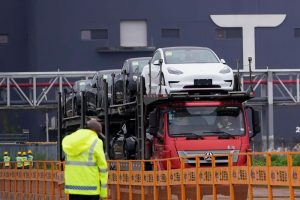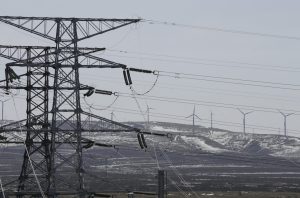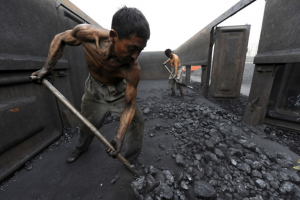Australia and the United States have signed a major agreement on critical minerals in a bid to negate China’s dominance in the rare earths and gallium sectors.
US President Donald Trump and Australian Prime Minister Anthony Albanese signed the $8.5-billion deal at the White House in Washington on Monday (Oct 20).
The first White House summit between Trump and Albanese was rated as a success by pundits Down Under, for ensuring not only significant US support for Australia’s mining sector, but because it also drew backing from Trump on a strategic deal on nuclear-powered submarines for Australia, under the AUKUS deal negotiated by the Biden Administration in 2023, to bolster security in the Indo-Pacific.
ALSO SEE: Spotlight on Rare Earths, Soybeans as US-China Trade Talks Loom
While Trump and Albanese greeted each other warmly, the US president expressed ire about past criticism of him by Australia’s US ambassador Kevin Rudd, a former prime minister. Rudd in 2020 called Trump “the most destructive president in history,” but later deleted the comment from social media.
Trump said he was not aware of the critical comments and asked where the envoy was now. Upon seeing him across the table, Trump said, “I don’t like you either, and I probably never will.” However, his remarks were later described as tongue-in-cheek and the pair allegedly played down their differences, according to an ABC Australia News report.
The visit otherwise appeared to go smoothly, with Albanese and Trump signing a minerals deal that Trump said was negotiated in recent months. Albanese described it as an $8.5-billion (A$13-billion) pipeline “that we have ready to go.”
Billions for outback miners
A copy of the agreement released by both governments said the two countries will each invest $1 billion over the next six months into mining and processing projects, as well as set a minimum price floor for critical minerals, a move that Western miners have long sought.
A White House statement on the agreement added that the investments would target deposits of critical minerals worth $53 billion, although it did not provide details on which types or the location of the mines.
“In about a year from now, we’ll have so much critical mineral and rare earths that you won’t know what to do with them,” Trump told reporters.
China’s foreign ministry did not comment directly on the deal but said on Tuesday that market and business choices form the global production and supply chain.
“Key mineral resource countries should play an active role in ensuring the safety and stability of the industrial and supply chain, and ensure normal economic and trade cooperation,” ministry spokesperson Guo Jiakun told a regular news briefing.
US offers $2.2bn to back mining projects
The US Export-Import Bank, which acts as the US government’s export credit agency, later announced seven letters of interest totaling more than $2.2 billion to advance critical minerals projects in Australia.
It said the letters went to Arafura Rare Earths, Northern Minerals, Graphinex, Latrobe Magnesium, VHM, RZ Resources, and Sunrise Energy Metals.
EXIM said the projects span a range of critical minerals essential to advanced defence systems, aerospace components, communications equipment, and next-generation industrial technologies.
The investments would support the re-industrialization of America’s high-tech manufacturing base, while helping to “counter China’s export dominance and ensure Western supply-chain resilience,” it said.
The Pentagon also plans to build a gallium refinery in Western Australia. China blocked gallium exports to the United States last December.
Shares of Arafura were up 8% in morning trading, while shares of Northern Minerals, Latrobe Magnesium, and VHM jumped 11%, 15% and 20% respectively, although Sunrise was trading lower. Those gains, which compared with a broader market rise of 0.7%, faded in later trading.
Alcoa gallium plant
Officials said they would also help advance a plan by US aluminium producer Alcoa to build a gallium plant alongside its alumina refinery just south of Perth that could provide up to 10% of global gallium supply. That news pushed Alcoa’s Australian-listed shares 8% higher.
Gallium, a raw material used in the production of alumina, is a critical mineral essential to technology, especially the computer chip and defence sectors.
Australia said in a statement that it would provide up to $200 million in concessional equity financing for the project, which includes offtake rights for the Australian government, while the US would also make an equity investment with offtake rights.
Alcoa in August signed a joint development agreement with Japan Australia Gallium Associates (JAGA), a venture between the Japanese government and Sojitz Corp, for the project.
The United States has been looking to boost its access to critical minerals around the world as China takes steps to strengthen control over global supply. Trade tensions between the United States and China have escalated ahead of Trump’s meeting with Chinese President Xi Jinping in South Korea next week.
The term critical minerals applies to a range of minerals, including rare earths, lithium and nickel, which are used for products ranging from electric vehicles to aircraft engines and military radars.
China has the world’s largest rare-earth reserves, according to US Geological Survey data, partly because it sources a vast supply of rare earths from war-torn northern Myanmar, but also because the process of refining rare earth elements is tricky and so toxic that it has deterred miners from setting up production facilities in western countries, which have far higher environmental standards.
Australia has significant rare earth reserves, but the only processing facility outside China currently used by an Australian miner (Lynas) is in Malaysia.
Trump supports nuclear subs deal
Albanese also got welcome support from Trump for the A$368 billion ($240 billion) AUKUS agreement, signed two years ago under then-President Joe Biden. Under the deal, Australia is buying US nuclear-powered submarines it hopes to receive in the 2030s, before building a new submarine class with Britain.
While Trump has been eager to roll back Biden-era policies, he signalled his intent to back the AUKUS submarine agreement, months after his team launched a review of the deal over concerns about the ability of the United States to meet its own submarine needs.
Navy Secretary John Phelan told the meeting the United States and Australia were working closely to improve the original AUKUS framework for all three parties “and clarify some of the ambiguity that was in the prior agreement.”
Trump said these were “just minor details,” adding that “there shouldn’t be any more clarifications, because we’re just – we’re just going now full steam ahead, building.”
Ahead of Monday’s meeting, Australian officials emphasized that their country is paying its way under AUKUS, contributing $2 billion this year to boost production at US submarine shipyards, and preparing to maintain US Virginia-class submarines at its Indian Ocean naval base, south of Perth, from 2027.
The delay of 10 months before Albanese’s first official meeting since Trump took office had caused some anxiety in Australia, as the Pentagon urged the Australian government to increase defence spending. But the two leaders met briefly on the sidelines of the United Nations General Assembly in New York last month.
The rare earths agreement came a week after US officials condemned China’s expansion of rare earth export controls as a threat to global supply chains.
Resource-rich Australia, wanting to extract and process rare earths, put preferential access to its strategic reserve on the table in US trade negotiations in April.
As part of the rare earths agreement, Trump and Albanese agreed to cut permitting for mines, processing facilities and related operations in order to boost production.
The deal called for cooperation on the mapping of geological resources, minerals recycling and efforts to stop the sale of critical minerals assets “on national security grounds.”
This was an oblique reference to China, which has bought major mining assets across the planet in the past decade, including the world’s largest cobalt mine in Congo, from US-based Freeport-McMoRan in 2016.
Trump ‘not interested in a war over Taiwan’
Commodities expert Clyde Russell said later on Tuesday that the US-Australia deal was important, but unlikely to be a game-changer in terms of ending Western reliance on China, “as it would take years to wean Western buyers off Chinese suppliers,” plus it was unlikely that such projects “could produce refined metals at prices competitive to those made in China.”
But perhaps the biggest revelation from the summit was Trump’s remarks downplaying any prospect of a conflict over Taiwan.
Former Australian PM Malcolm Turnbull, who has long opposed Australia making a massive investment in US nuclear subs, said Trump showed that he is “not going to contemplate any hostilities.”
That view appeared to be shared by James Curran, an international relations expert, who told the ABC’s 7.30 Report that Mr Trump wants a trade deal, and had “made it very clear today that he’s not interested in a conflict with China”.
Turnbull said he also believed from his talks with Trump during the US leader’s first term that Trump “genuinely is not a warmonger .. he wants peace.”
- Jim Pollard with Reuters
NOTE: This text was updated with further details (notably the last five pars) on Tuesday Oct 21, 2025
ALSO SEE:
US-China Tensions Rise Amid Disputes on Rare Earths and Trade
China Hits US Ships With Extra Port Fees as Trade Tensions Rise
China Making Exports Of Rare Earth Magnets ‘Increasingly Difficult’
China Starts Collecting Tit-For-Tat Port Fees On US-Owned Ships
Lessons From Japan on Tackling China’s Rare Earth Dominance
China Steps up Checks on Nvidia AI Chips at Major Ports
Trade Deal Signed, But China Still Slow to Release Rare Earths
China Did Not Agree to Military Use of Rare Earths, US Says























